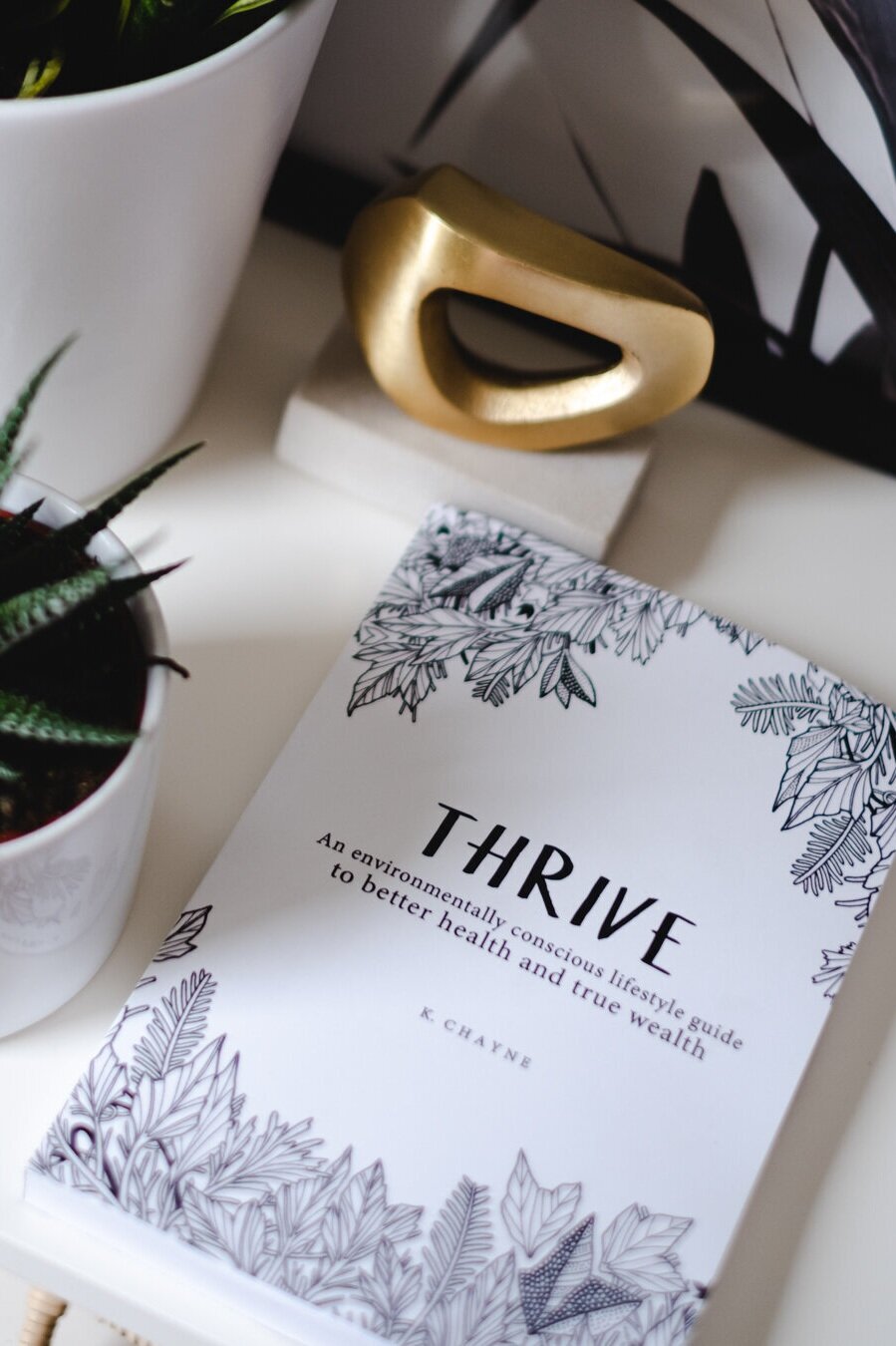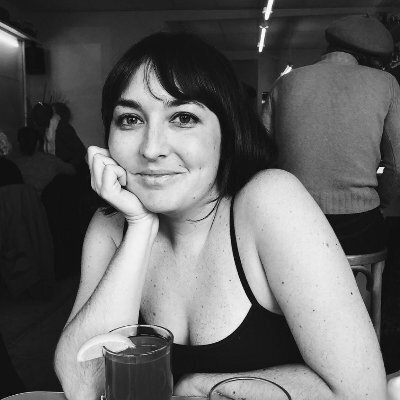11 Must-Read Books on Sustainability
The search for the best summer beach read normally drives you to the romance or mystery aisles, but this year we challenge you to check out some of our favorite books on sustainability. These books not only inform us of the issues, but they also paint the picture of a world worth fighting for and uplift the efforts we can make to be the heroes of our own sustainable stories.
Whether highlighting the simple daily choices, encouraging a commitment to large lifestyle changes, or illuminating the industries whose inherent environmental strain pushes them towards innovation, these books elevate the genre of sustainable writing through their unique approaches to providing a powerful range of resourceful information. Enjoy!
THRIVE by Kamea Chayne
Published in 2016, Thrive remains a go-to guide for an environmentally conscious lifestyle. First-time book author Kamea Chayne takes a holistic approach to healthy living with the ideology that total wellness requires us to not only take care of ourselves, but also the planet we call home. This comprehensive introduction into world sustainability offers suggestions, exercises, and evidence that call upon readers to participate in sustainability in all parts of their life – from their shopping and eating habits to their health and wealth aspirations.
Chayne sees happiness as something that is cultivated within and intrinsically linked to how sustainably we navigate through our lives.
SOURCE MY GARMENT by Adila Cokar
Source My Garment, An Insider’s Guide to Responsible Offshore Manufacturing by Adila Coaker provides a step-by-step guide for designers to build a successful and sustainable business in the fashion industry.
With over a decade of experience in everything from product development to manufacturing and business strategy, Coaker calls on entrepreneurs and start-ups to follow her set of tried and true practices in every facet of production.
Coaker’s writing tackles the most challenging parts of manufacturing by providing the tools to avoid problems and enhance fun. By humanizing the production process, Coaker shows how designing sustainably – and keeping profits on par with people and the planet – is the right recipe for a prosperous business.
ON FIRE by Naomi Klein
As a fierce journalistic voice reporting on the political policies that affect our planet for over twenty years, Naomi Klein writes On Fire: The (Burning) Case for a Green New Deal from an unapologetically raw perspective.
Klein explores the battles we face from the political and economic giants who take our environment for granted.
Harnessing the urgency of the climate crisis as it propels the rising movement towards a Green New Deal.
Through long-form essays that chronicle the cultural response to environmental crises, society itself is called upon to not just fix our immediate problems, but to change the system that allowed them to happen in the first place.
ZERO WASTE HOME by Bea Johnson
Known as the pioneer of zero-waste living, Bea Johnson breaks down her transformation into a sustainable lifestyle by the 5 Rs: Refuse, Reduce, Reuse, Recycle, Rot. Zero Waste Home: The Ultimate Guide to Simplifying Your Life shows how these key principles can be applied to every aspect of your home to reduce waste and save money, along with the planet. With tips on how to diminish your environmental footprint and improve your quality of life, this manual for simplicity is a reflection of the writer’s own experience with her home and family.
By sharing insight and advice, she shows how attainable (and easy!) cutting back really is, and the big impact made by even the tiniest changes.
HOW VEGANISM CAN SAVE US by Emma Hakansson
Written by one of our very own contributors, How Veganism Can Save Us is “a little book about the big ideas behind veganism.”
It discusses the impact animal agriculture is having on our environment, waterways, as well as our personal wellbeing and mental health. She explores the potential benefits of eating a plant-based diet can help make change that will help reverse environmental devastation, improve our overall health and save animals from the violent and oppressive system they have been born into.
A great primer for any curious or beginner vegan, this book is small enough to fit in a pocket and read on the daily commute!
CRADLE TO CRADLE by Michael Braungart and William McDonough
Though originally released nearly 20 years ago, Cradle to Cradle: Remaking the Way We Make Things remains a highly recommended book on sustainability. German chemist Michael Braungart and U.S. architect William McDonough put forth a manifesto of what was then a radical approach to the philosophy of environmentalism: creating value from waste. Upcycling is more common in today’s conversations, but this book was the first of its kind to disrupt the normal pattern of cradle-to-grave and paved a path towards the mainstream for this new strategy.
Cradle to Cradle provides the framework of the redesign revolution that encourages manufacturing to be done with the goal of removing the idea of waste altogether.
BRAIDING SWEETGRASS by Robin Wall Kimmerer
For all our plant lovers, this is the book for you! Robin Wall Kimmerer, a botanist, writes Braiding Sweetgrass: Indigenous Wisdom, Scientific Knowledge and the Teachings of Plants. Kimmerer draws on her experiences of being a woman in science to show how our biggest questions of nature can be answered by our oldest teachers — plants and animals. This book introduces the reader to a way of listening to the lessons that plants and animals teach us and, in turn, better understand the generosity of the earth.
In her reflections, we are guided through an awakening of ecological consciousness to celebrate how we receive from living things, and how we can give back.
OVERDRESSED by Elizabeth Cline
In her debut book, Overdressed: The Shockingly High Cost of Cheap Fashion, journalist Elizabeth Cline reveals her past obsession with fast fashion and how she has come to see it as a destructive enemy of our environment. Putting a spotlight on the plague of the typical American shopper whose habits often include buying cheap, poorly made clothes in abundance. Cline sets out to uncover the true nature of the fast fashion juggernaut, and shows how consumers can break the buy-and-toss cycle by supporting sustainable designers and optimizing the lifespan of the clothes they own.
THE CONSCIOUS CLOSET by Elizabeth Cline
Much like the clothing she promotes, Cline is just as good the second time around.Her follow-up book, The Conscious Closet: The Revolutionary Guide to Looking Good While Doing Good, finds readers who are asking how they should change their approach to fashion and walks them through the necessary steps. Acknowledging that clothes are one of our strongest avenues of personal expression, Cline helps readers to build a wardrobe that they love, but with greater intention and awareness of where their clothes come from and the materials on the tag.
Most importantly, she shares why it matters with a call to action looking to transform a polluting industry into a force for good by starting with our own closets. From there, we can connect to the impassioned community fighting for systematic change.
HAPPY CITY by Charles Montgomery
City dwellers who love the environment often find themselves at this perplexing intersection of enjoying urban life while being surrounded by the infrastructures and industries that pollute our planet.
Charles Montgomery’s Happy City: Transforming Our Lives Through Urban Design discusses the challenges cities face and the innovative solutions being implemented all over the world to empower communities to be more sustainable.
Using the disciplines of psychology, neuroscience, and urban planning, Montgomery makes the argument that the way we build our cities affects the way we feel as individuals and as a society. When we build a green, low-carbon city, we are building a Happy City.
NEW RELEASES!
A POCKET GUIDE TO SUSTAINABLE FOOD SHOPPING By Kate Bratskeir
Having hit shelves in January 2021, A Pocket Guide to Sustainable Food Shopping: How to Navigate the Grocery Store, Read Labels, and Help Save the Planet by Kate Bratskeir helps shoppers make better decisions in the grocery store. A practical, modern guide to reducing your food and packaging waste – and in return, your carbon footprint – starts in the aisles.
Regardless of where you are in your sustainability journey, this book offers the tools you need to make a difference when choosing your favorite dairy products, vegetables, and everything in between. Kratskeir gives shoppers the confidence to better understand what is written on food labels, recognizing greenwashing terms, asking questions about food sourcing, and picking the right packaging.
IMAGINE IT! by Laurie David and Heather Reisman
Imagine It!: A Handbook for a Happier Planet offers easy ways to replace old, planet-hurting habits with healthy new ones. Though only on the market for a few months as of May 2021, it comes with the stamp of approval from Former Vice President Al Gore right on the cover. Co-author Laurie David acted as a producer on Gore’s 2006 documentary An Inconvenient Truth, and is a lifelong environmental activist.
The handbook highlights necessary changes to our food, clothing, and transportation habits, with each chapter dedicated to a different lifestyle shift to lower our use of plastic, paper, water, and harmful chemicals to create lasting change.
[SPECIAL MENTION : Renowned writer of fashion, feminism, and sustainability, Aja Barber’s book Consumed: On Colonialism, Climate Change, Consumerism & the Need for Collective Change will be released in September of this year and currently available for pre-order!]
About the Author
Julia Grinberg is a writer based in Philadelphia, PA. She is a blog contributor for the vegan shoe brand Sylven New York, and the upcycled leather accessories brand Hyer Goods. When she is not writing on the topic of sustainable fashion, she is crafting short stories for various outlets and is currently working on a collection of creative nonfiction essays.















